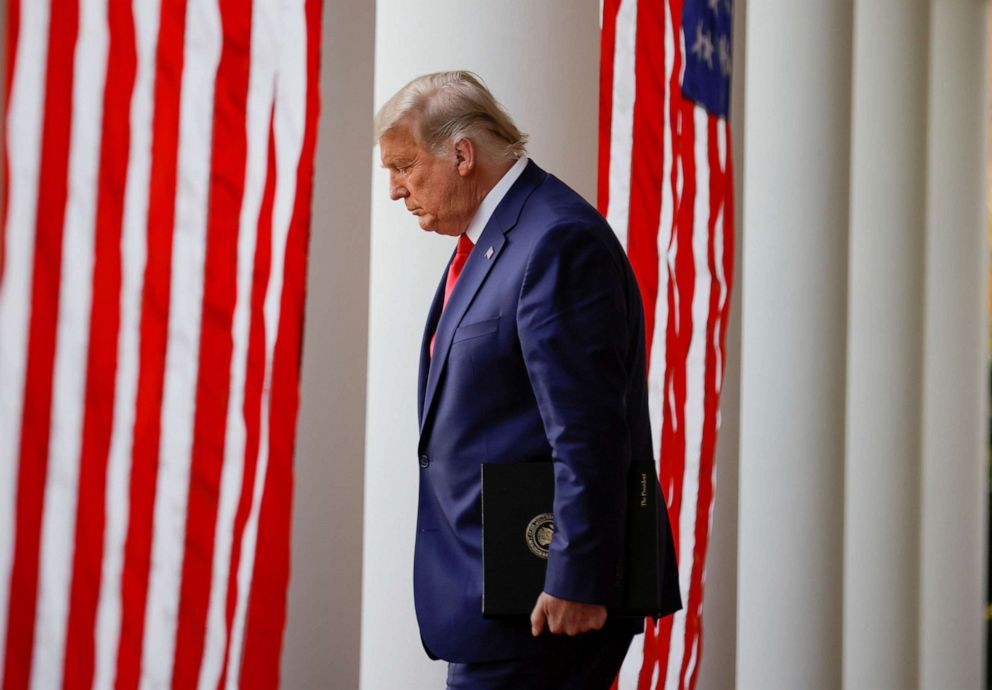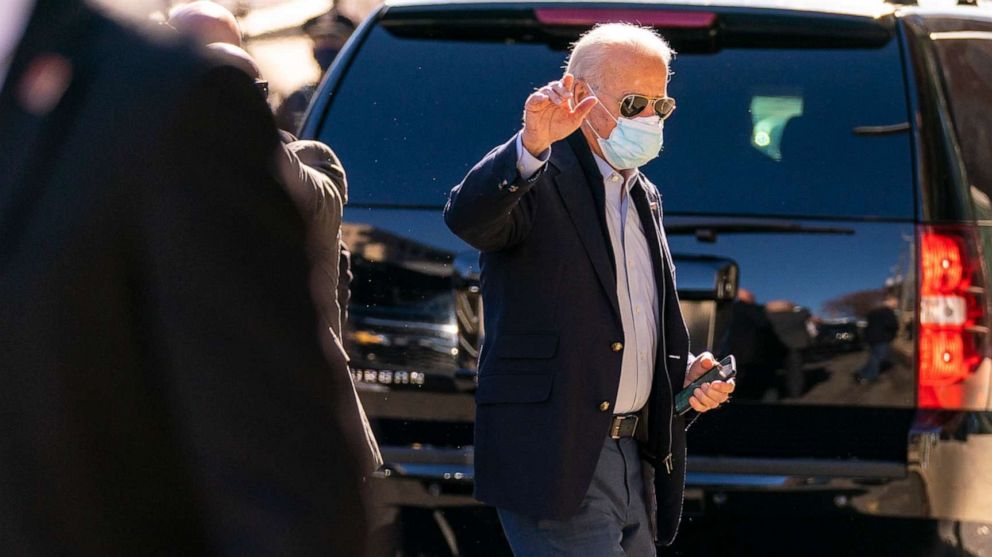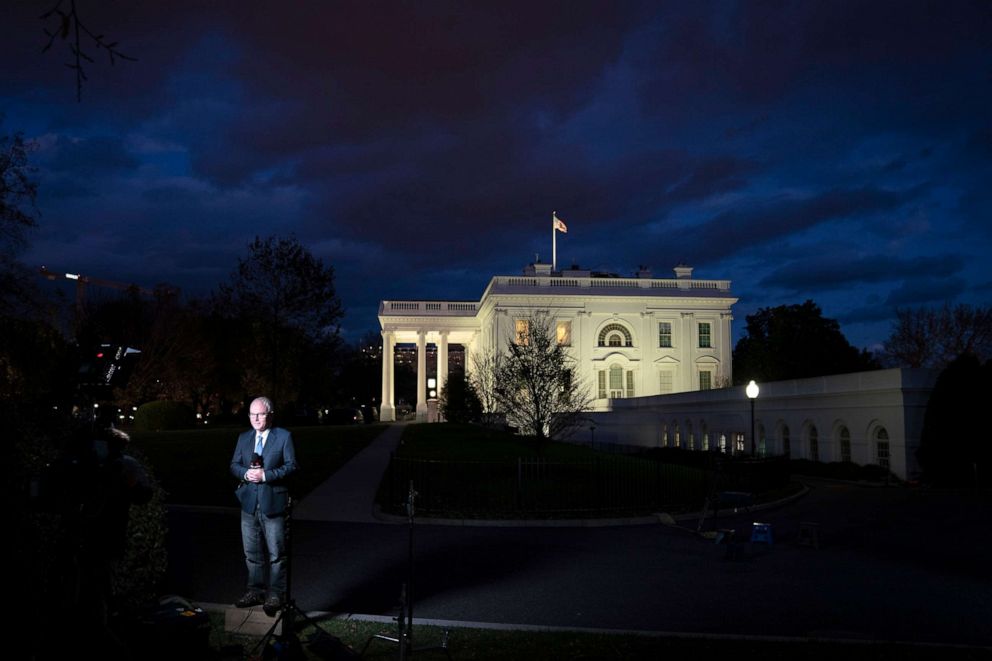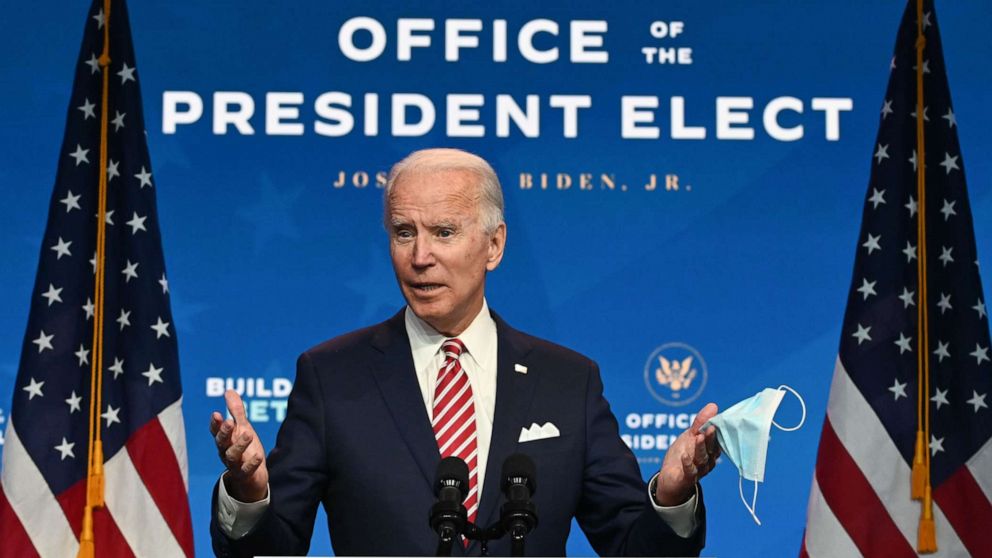It’s a sign that the former vice president is plowing ahead with his transition.
By John Santucci, Josh Margolin, and Lucien BruggemanNovember 18, 2020, 12:59 PM
President-elect Joe Biden’s transition team is turning to a group of former officials, who served in the Trump administration, for guidance on major national security threats to the country, multiple sources confirmed to ABC News, a sign that the former vice president is plowing ahead with his transition to power despite unprecedented obstacles.MORE: The Note: Biden tries end-around of defiant TrumpADVERTISEMENT
The backchannel outreach to at least four former officials who served in senior-level roles comes as the General Services Administration continues withholding its ascertainment of Biden as winner of the presidential election, effectively denying him access to key resources and briefings meant to ensure a safe and secure continuity of government on Jan. 20.
As a result, sources familiar with the matter said that Biden’s team has been in contact with those who have recent experience in various federal agencies, and in most cases the individuals are career officials and not political appointees. It was not clear exactly what information the transition team is soliciting from these former officials, but it was not believed to include classified materials.

Mick Mulroy, a former senior Pentagon official who briefed the transition team on Tuesday afternoon, described his participation in the transition process as a patriotic duty — not a political calculation. During his two years in the Trump administration, which ended in December 2019, Mulroy oversaw the Pentagon’s military policy in the Middle East — a valuable area of expertise as Biden and his top aides endeavor to fill key national security positions.
“The incoming national security team deserves to have the full support of a transition to ensure the seamless transfer of power without incurring any unnecessary risk to our nation’s security,” said Mulroy, who is currently an ABC News contributor. “I am supporting the incoming transition team because it is the right thing to do.”
Despite substantial vote margins in Biden’s favor and a crumbling legal effort to challenge election results, the GSA has yet to officially name Biden as president-elect, denying him resources typically offered to an incoming administration.

Without the GSA’s sign-off, Biden and his team may assume power without a full understanding of the military and diplomatic landscape, which could pose a risk to national security, experts told ABC News.MORE: GSA official blocking Biden’s transition appears to privately plan post-Trump career
The intelligence community is not beholden to the GSA ascertainment to begin briefing the incoming administration, but has said publicly it would nonetheless avoid contact with the Biden transition until the former vice president is officially acknowledged as the winner.
“If the Biden team wants to adapt to emerging challenges or be in a position to respond to immediate crises, they need to understand what’s happening — and where the pieces are on the global chess board,” said Christopher Swift, a national security lawyer.
David Marchick, director of the nonprofit and nonpartisan Center for Presidential Transition, said that under normal circumstances, “transitions of power have always been seen as a nonpartisan, continuity-of-government effort critical to our nation’s future and to our national security.”

“The norm is that there’s full cooperation,” Marchick added. “We’re obviously seeing the absence of a norm.”
Without access to current administration officials, sources said the Biden transition is left to rely on Mulroy and like-minded subject matter experts to help them prepare for office. In 2016, the outgoing Obama administration “helped Trump officials in their onboarding process,” Marchick said.
“So yes, it is not surprising that many Trump officials would want to help the incoming president-elect,” Marchick added.
Since the summertime, top advisers to Biden prepared for the possibility that Trump and his administration would refuse to cooperate with the normal transition process, insiders told ABC News.
While all modern presidential campaigns task people to work on a transition, the Biden effort prepared two distinct tracks in anticipation of cooperation challenges from the Trump administration: one that would include cooperation between the incoming and outgoing teams; and a separate Plan B that would feature secret backchannel communications and off-the-books briefings by people either still in the government or those who had departed only recently.

For the latter approach, the Biden team used former officials as emissaries amid the Trump administration’s reluctance in transitioning power. In addition to military, diplomatic and national security affairs, the Biden transition team is focusing on other key areas like law enforcement and homeland security – disciplines that are traditionally both apolitical and critical to the daily functioning of the nation.
“The call was basically, ‘we come in peace, help us keep the lights on’,” said one former Trump official who was contacted by the Biden team and has provided assistance but will not take on any formal public role in either the transition or within a Biden administration.
Reached for comment, a Biden transition official pointed to a line in a Nov. 10 statement announcing the agency review teams: “The transition’s work continues full steam ahead. The agency review teams will proceed by meeting with former agency officials and experts who closely follow federal agencies, and with officials from think tanks, labor groups, trade associations, and other NGOs,” the statement read.
Last week, a growing chorus of Republican senators encouraged the president to grant Biden access to the President’s Daily Brief, a roundup of intelligence collated every day with geopolitical insights based on highly classified sources and methods.MORE: Infighting and an attempted ‘coup’: Trump team erupts into chaos as Giuliani takes over legal efforts
On Tuesday, Senate Majority Leader Mitch McConnell shifted his tone toward accepting Biden as the president-elect, assuring reporters on Capitol Hill that “we are going to have an orderly transfer from this administration to the next one.”
Meanwhile, Biden and his top advisers remain unfazed — at least publicly — by the stunted transition period. On Tuesday, a panel of national security experts briefed President-elect Biden and Vice President-elect Harris on the “diplomatic, defense, and intelligence challenges the administration will inherit on day one,” according to a statement released afterward.
“The broader transition team will continue to hear from distinguished former practitioners,” the statement continued, “especially as the lack of GSA ascertainment prevents the transition from meeting with and hearing from current executive branch officials.”


